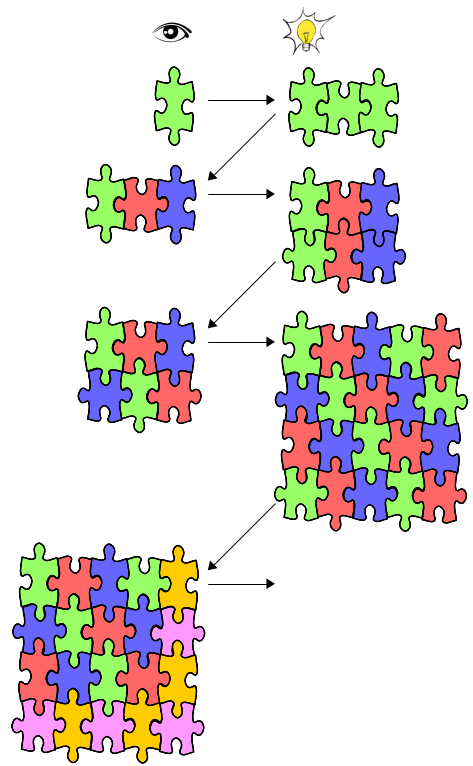Scientific methodology and world view
22 jan. 2014The scientific methodology is all about observation and prediction. We develop models and theories based on what we can observe. We then try to predict what we would observe in new situations, perform new observations and compare it to our predictions. Key to this process is to always look for new and more precise methods for direct or indirect observation and to always look for evidence disapproving of our current theories. Question every assumption and conclusion.

The scientific belief system is thus different from what is typically called a religious belief. A religious belief system is based on and enforced with authority. It is absent of verifiable observable evidence. As a consequence of not being restricted by this, religion tends to answer questions that are not relevant with scientific glasses on, like how matter can be created from nothing. If the answer is God then we're left where we started. We still don't know.
When scientists talk of "creating matter from nothing", they probably mean "matter from energy". Einstein showed us that energy and mass are two properties of the same thing given that the total amount of and maximum speed of energy is constant. If you move faster, more mass will change form into energy and if you move even faster then time will slow down in order to "protect the formula". This is a strong hint of something more complex going on behind the scenes. The big bang was not when matter and energy was "created" from nothing. Everything we have around us and consist of must have existed before the big bang, although not in it's present form. Another thing that fascinates me is how time is affected by gravity. A strong gravitational field will slow down time compared to weaker fields. Our models predict this, but they are based on a definition of time being:
The second is the duration of 9 192 631 770 periods of the radiation corresponding to the transition between the two hyperfine levels of the ground state of the caesium 133 atom.http://www.bipm.org/en/si/si_brochure/chapter2/2-1/second.html
This means that time is defined in terms of a physical phenomena and if time slows down that means that the rate of radiation has decreased. If very high speeds or gravity can affect the rate of this atoms radiation, then the assumption must be that all atoms are "slowed down". Could claiming that time can run with different speeds in separate locations be a matter of definition, not actual change in the flow of events? Time travel into the future is a proposal that is built on slowing time down compared to the location we want to travel in to. If time moves twice as fast outside the time machine then you could travel 10 years in 5 years. Naturally, we don't have any experimental data that suggest that a human would survive in such conditions (high speed or high gravitational pull. If you move with the speed of light and thus become energy, can you turn back into a human by slowing down?).
Evolution is our best explanation of how we humans ended up where we are. Evolution is simple and elegant, but without any purpose or goal. The question of a God or higher meaning tends to come back when we humans are faced with situations without meaning. Science can not answer questions regarding a God because we can't definite what a God or even existence is. In order to define existence we would have to define not existing and we have no observation of it (if we had, it would exist, right?).
As a society we rely on moral, ethics, laws and regulation. One could say evolution needs these things and that evolution currently evaluates collaboration and coexistence as most fit. Whether or not there is a universal concept of "good" and "evil" or if it is dependent on the context is an interesting thought. Being restricted to current scientific knowledge means everything we do has no intrinsic meaning or value, except for enjoying the "now". Can you believe in that?
Q&A with Tim Keller - Reason for God?
Something from nothing - Richard Dawkins
"Science Refutes God" Debate - Intelligence Squared